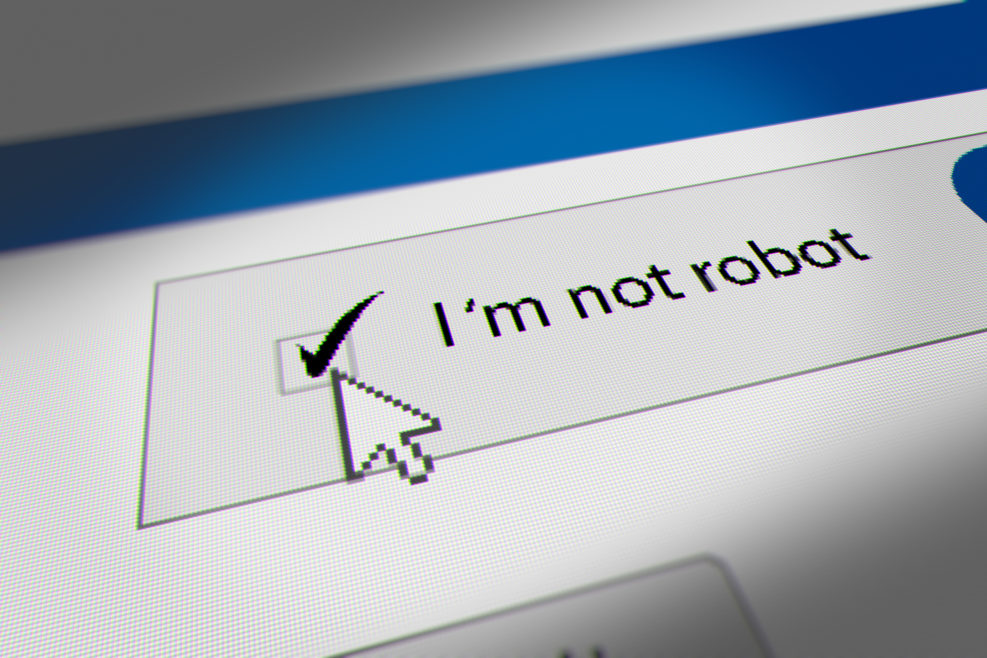
TagTuring Test


CAPTCHA: How Fooling Machines Is Different From Fooling Humans
Automated censorship is intended to protect against a tidal wave of spam but it could certainly have other uses…Readers of Mind Matters News have likely heard of the iconic Turing test. Computer pioneer Alan Turing famously invented a test to determine whether a program could pass as a human. The gist is, if a program can fool human testers into believing it is a human, then the program is intelligent. Not everyone is convinced. Thing is, it doesn’t take much to fool us humans! Take Eliza , a program of only a few hundred lines, written in the 60s, which fooled many people into believing it was a real human therapist. But what if we flip the Turing test on its head? Instead of a test where a program tries to pass as human, we use a test Read More ›

An Excerpt from Chapter Two of Non-Computable You
What You Do That Artificial Intelligence Never Will by Mind Matters podcast host Robert J. Marks is now available in audiobook form. Listen now to an excerpt from the second chapter as read by Larry Nobles. Will machines someday replace attorneys, physicians, computer programmers, and world leaders? What about composers, painters, and novelists? Will tomorrow’s supercomputers duplicate and exceed humans? Read More ›

Turing Tests Are Terribly Misleading
Black box algorithms are now being trusted to approve loans, price insurance, screen job applicants, trade stocks, determine prison sentences, and much more. Is that wise?In 1950 Alan Turing proposed that the question, “Can machines think?,” be replaced by a test of how well a computer plays the “imitation game.” A man and woman go into separate rooms and respond with typewritten answers to questions that are intended to identify the players, each of whom is trying to persuade the interrogators that they are the other person. Turing proposed that a computer take the part of one of the players and the experiment be deemed a success if the interrogators are no more likely to make a correct identification. There are other versions of the game, some of which were suggested by Turing. The standard Turing test today involves a human and a computer and Read More ›

Move Over Turing and Lovelace – We Need a Terminator Test
More research should be spent on a Terminator test to mitigate the threat of an unfriendly, all-powerful artificial intelligenceWhat we really need is not a Turing test or a Lovelace test, but a Terminator test. Just imagine. If we create an all-powerful artificial intelligence, we cannot assume it will be friendly. We cannot guarantee anything about the AI’s behavior due to something known as Rice’s theorem. Rice’s theorem states that all non-trivial semantic properties of programs are undecidable. Benevolence is certainly a non-trivial semantic property of programs, which means we cannot guarantee benevolent AIs. Therefore, what we really need is a way to distinguish the all-powerful artificial intelligence from human intelligence, so we can protect ourselves from humanized mass murdering robots. Let us think about this in terms of test errors. When we perform a test on some Read More ›

What If Your AI Started To Talk Like a Human? — Sci-fi Saturday
Should you just shut it down and leave the building?“Intelligentia” (2020) by Ken Shinozaki (at DUST July 7, 2021, 11:12 min) “Lisa receives a butler A.I. to Turing test, and over the course of the procedure, she discovers the A.I. is not what it seems and her entire world disrupted.” Review: It’s a harrowing tale with a strong performance by Rain Fuller as Lisa and C. J. Baker as her boss. Lisa seems to be on the brink of a breakdown. Which the AI, “Eugene,” seems to have spotted… “Eugene” soon takes charge of the interview. And it becomes clear that “Eugene” is a conscious being. It’s fun sci-fi and well worth the watch. But a bit implausible toward the end. We are told that “Eugene” — essentially just Read More ›

Why Human Creativity Is Not Computable
There is a paradox involved with computers and human creativity, something like Gödel’s Incompleteness Theorems or the Smallest Uninteresting NumberIn last week’s podcast, “The Chaitin Interview IV: Knowability and Unknowability,” Walter Bradley Center director Robert J. Marks interviewed mathematician Gregory Chaitin, best known for Chaitin’s Unknowable Number, on a number of things, including whether computers can show creativity. Chaitin has thought a lot about that: https://episodes.castos.com/mindmatters/Mind-Matters-127-Gregory-Chaitin.mp3 This portion begins at 21:34 min. A partial transcript, Show Notes, and Additional Resources follow. Robert J. Marks: We’re talking, just in general, about the unknowable. Roger Penrose recently won a Nobel Prize for his work with Stephen Hawking on black hole theory. He also wrote a book called The Emperor’s New Mind: Concerning Computers, Minds and The Laws of Physics (1989) and he followed it up with The Shadows of the Mind: Read More ›

Is It Ethical To Scrap Star Trek’s Commander Data for Research?
A philosopher offers a thoughtful review of the caseIn a thought-provoking essay, San José State University philosopher Anand Vaidya asks, should it be okay to dismantle Star Trek‘s robotic crew member Data for research purposes, as proposed in the “The Measure of a Man” episode in Star Trek: The Next Generation? Some of the Trek brass seemed to think so: Vaidya disagrees: As real artificial intelligence technology advances toward Hollywood’s imagined versions, the question of moral standing grows more important. If AIs have moral standing, philosophers like me reason, it could follow that they have a right to life. That means you cannot simply dismantle them, and might also mean that people shouldn’t interfere with their pursuing their goals. Anand Vaidya, “If a robot is conscious, is it Read More ›

Can AI Write the Great American Novel? Or Compose Sports News?
It’s a split decision, say Rensselaer prof Selmer Bringsjord and Baylor computer engineering prof Robert J. MarksIn a recent podcast, Rensselaer professor Selmer Bringsjord discusses AI and creativity with computer engineering professor and Walter Bradley Center director Robert J. Marks. The difference between writing novels and playing games like Go and chess is that writing novels does not mean winning according to a set of rules. A machine can be programmed with rules and do the calculations faster—much, much faster—than a human. A good novel requires creativity in the face of situations that are only partly definable. If a novel succeeds, many people agree that the writer has captured essential elements of human nature and life circumstances. That’s what makes the great novels so memorable. Sports reporting is somewhere in the middle in that a great Read More ›

Bingecast: Selmer Bringsjord on the Lovelace Test
The Turing test, developed by Alan Turing in 1950, is a test of a machine’s ability to exhibit intelligent behaviour indistinguishable from a human. Many think that Turing’s proposal for intelligence, especially creativity, has been proven inadequate. Is the Lovelace test a better alternative? What are the capabilities and limitations of AI? Robert J. Marks and Dr. Selmer Bringsjord discuss Read More ›

Are We Here to Re-Create Ourselves?
What are the capacities of human-like robots? Will they ever replace humans? Dr. Geoffrey Simmons and Dr. Robert J. Marks discuss artificial intelligence, outer space, consciousness, and Dr. Simmons’ book Are We Here to Re-Create Ourselves?: The Convergence of Designs. Show Notes Additional Resources

Six Limitations of Artificial Intelligence As We Know It
You’d better hope it doesn’t run your life, as Robert J. Marks explains to Larry LinenschmidtThe list is a selection from “Bingecast: Robert J. Marks on the Limitations of Artificial Intelligence,” a discussion between Larry L. Linenschmidt of the Hill Country Institute and Walter Bradley Center director Robert J. Marks. The focus on why we mistakenly attribute understanding and creativity to computers. The interview was originally published by the Hill Country Institute and is reproduced with thanks. https://episodes.castos.com/mindmatters/Mind-Matters-097-Robert-Marks.mp3 Here is a partial transcript, listing six limits of AI as we know it: (The Show Notes, Additional Resources, and a link to the full transcript are below.) 1. Computers can do a great deal but, by their nature, they are limited to algorithms. Larry L. Linenschmidt: When I read the term “classical computer,” how does a computer function? Let’s build on Read More ›

Bingecast: George Montañez on Intelligence and the Turing Test
What do computer scientists say about the ability of machines to think? Alan Turing, the father of modern computer science, tackled the question in 1950 and proposed the Turing test as an answer. Is the Turing test important today? Can a deeper undertanding of intelligence be culled for the Turing test? Robert J. Marks discusses the Turing test, artificial intelligence, Read More ›

Lovelace: The Programmer Who Spooked Alan Turing
Ada Lovelace understood her mentor Charles Babbage’s plans for his new Analytical Engine and was better than he at explaining what it could doTuring thought that computers could be got to think. Thus he had to address Lovelace’s objection from a century earlier, that they could not be creative.
Read More ›
Thinking Machines? The Lovelace Test Raises the Stakes
The Turing test has had a free ride in science media for far too long, says an AI expertIn the view of Rensselaer philosopher and computer scientist Selmer Bringsjord, the iconic Turing test for human-like intelligence in computers is inadequate and easily gamed. Merely sounding enough like a human to fool people does not establish human-like intelligence. He proposes the much more challenging Lovelace test, based on an observation from computer pioneer Ada Lovelace (1815–1852) that true creativity is what distinguishes humans from machines.
Read More ›
Will AI Ever Write a Critically Acclaimed Novel?
AI is starting to write and some of the copy reads quite well. Other writing is garbage. What’s the capability and limitation of writing by AI? Will AI ever write a novel that wins the Nobel Prize for Literature? Robert J. Marks and Dr. Selmer Bringsjord discuss creativity, artificial intelligence, and writing. Show Notes 00:37 | Introducing Selmer Bringsjord, Professor Read More ›

The Turing Test is Dead. Long Live The Lovelace Test
The Turing test, developed by Alan Turing in 1950, is a test of a machine’s ability to exhibit intelligent behaviour indistinguishable from a human. Many think that Turing’s proposal for intelligence, especially creativity, has been proven inadequate. Is the Lovelace test a better alternative? Robert J. Marks and Dr. Selmer Bringsjord discuss the Turing test, the Lovelace test, and machine Read More ›

A Scientific Test for True Intelligence
A scientific test should identify precisely what humans can do that computers cannot, avoiding subjective opinionThe “broken checkerboard” is not the ultimate scientific test for intelligence that we need. But it is a truly scientific test in the sense that it is capable of falsifying the theory that the mind is reducible to computation.
Read More ›
Current Artificial Intelligence Research Is Unscientific
The assumption that the human mind can be reduced to a computer program has never really been testedBecause AI research is based on a fundamental assumption that has not been scientifically tested—that the human mind can be reduced to a computer—then the research itself cannot be said to be scientific.
Read More ›
Tech pioneer Ray Kurzweil: We Will Merge with Computers by 2045
For computers, “Even the very best human is just another notch to pass,” he told the COSM Technology SummitAdvocates point to the success of Kurzweil’s past predictions as evidence that his Singularity is indeed Near, as his 2005 book predicts or Nearer, as his forthcoming one (June 2020) does. But questions bubbled to the surface.
Read More ›